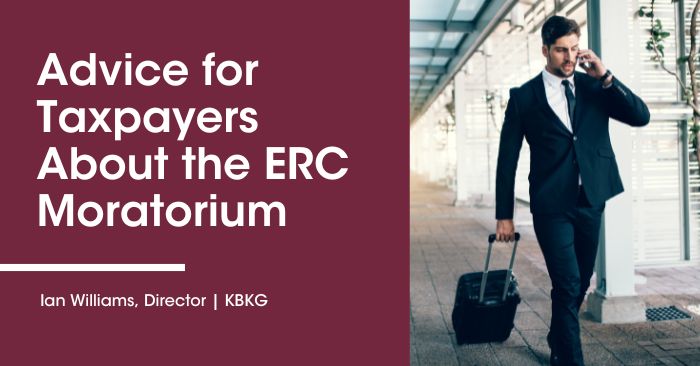Advice for Taxpayers About the ERC Moratorium
Thought Leadership by Ian Williams, Director | KBKG
The Employee Retention Tax Credit (ERC) is a complex tax credit created by the Coronavirus Aid, Relief, and Economic Security (CARES) Act in 2020 to help businesses keep their employees on the payroll during the COVID-19 pandemic. The ERC is available to eligible businesses of all sizes, and it can be claimed for qualified wages paid to employees between March 13, 2020, and December 31, 2021.
For those awaiting 941-X processing for an ERC claim:
Expected processing times for ERC claims could easily stretch to 180 days or longer. This is due to the high volume of claims the IRS is processing. If you are awaiting an ERC claim, it is important to be patient and to continue to follow up with the IRS on the status of your claim. You can do this by checking the status of your claim online or by calling the IRS at 1-800-829-4933.
For those who have not evaluated ERC eligibility yet:
The IRS urges businesses to talk to a trusted tax professional – not a tax promoter or marketing firm looking to make money-generating applications – before filing an ERC claim. There are several reasons why:
- xPredatory companies are filing fraudulent claims.
- ERC is a complex tax credit, and the different IRS rules and regulations must be considered when determining eligibility for the credit.
- The IRS has yet to issue any news on when the moratorium will be lifted, although we anticipate it will happen sometime in early 2024.
- A trusted tax professional can help you to determine whether you are eligible for the ERC, and they can also help you to file your claim correctly.
For those who have established eligibility but have not yet filed 941-Xs:
We recommend reviewing the eligibility requirements and the credentials of the tax professional you are working with before filing ERC claims. If you feel confident in your qualification, then you can proceed with filing a 941-X, just keep in mind the IRS will not likely resume processing until early 2024. Once the IRS moratorium on ERC processing ends, processing times for 941-X amended tax returns will likely stretch to longer than six months. This is due to the high volume of amended tax returns the IRS is processing. If you still need to file a 941-X to claim the ERC, it is essential to be patient and follow up with the IRS on your amended tax return status.
Tips for CPAs and their clients who are considering claiming the ERC:
- Be aware of the eligibility requirements. For businesses to be eligible for the ERC, a government order must have partially or fully suspended a business due to COVID-19, or it must have experienced a significant decline in revenue meeting eligibility thresholds.
- Keep accurate records. Upon audit, the IRS will require you to provide documentation to support your ERC claim. This documentation should include payroll records, financial statements, and any other documentation that shows the impact of COVID-19 on your business as it relates to the eligibility requirements.
- File your claim correctly. Form 941-X, Amended Employer’s Quarterly Federal Tax Return, is used to claim ERC. It is important to file this form correctly to ensure your claim gets processed on time.
- Stay up to date on the latest ERC guidance. The IRS is constantly issuing new guidance on the ERC, so staying up to date on the latest developments is crucial. This is especially important during the moratorium on the ERC.
- Outsource the ERC claiming process to a qualified professional. You can outsource the process to a qualified professional if you need more time or resources to file ERC claims independently.
- Have a deep understanding of the ERC. Read the IRS guidance, attend webinars, and take courses.
- Develop a process for helping clients to claim the ERC. Create a checklist of documents that need to be collected, a template for the 941-X form, and a system for tracking the status of claims.
- Communicate regularly with clients about the ERC. Inform them of the latest IRS guidance and the status of their claims.
- Be proactive in helping clients to claim the ERC. Take your time with clients coming to you. Reach out to them and tell them about the ERC and how you can help them claim it.
By following these tips, CPAs can become trusted advisors to their clients on the ERC.
The ERC is a valuable tax credit that can help businesses offset the cost of employee wages during the COVID-19 pandemic. Suppose you are a CPA or a business owner considering claiming the ERC. In that case, it is vital to know the eligibility requirements, keep accurate records, and file your claim correctly.
Related Pages
- Supply Chain Disruption – How to Get Compliant for the ERC
- Employee Retention Tax Credit – Benefit Estimate
- Where is My Employee Retention Credit Refund?
- KBKG Tax Insight: IRS warns Taxpayers of Improper Employee Retention Credit Claims and ERC Mills
- KBKG Tax Insight: IRS To Target Abusive ERTC Claims. Analysis of Government Shutdown & Supply Chain Rules
- It’s Not Too Late to Claim Employee Retention Tax Credits
- The Employee Retention Tax Credit (ERC): What Small Businesses Need to Know


